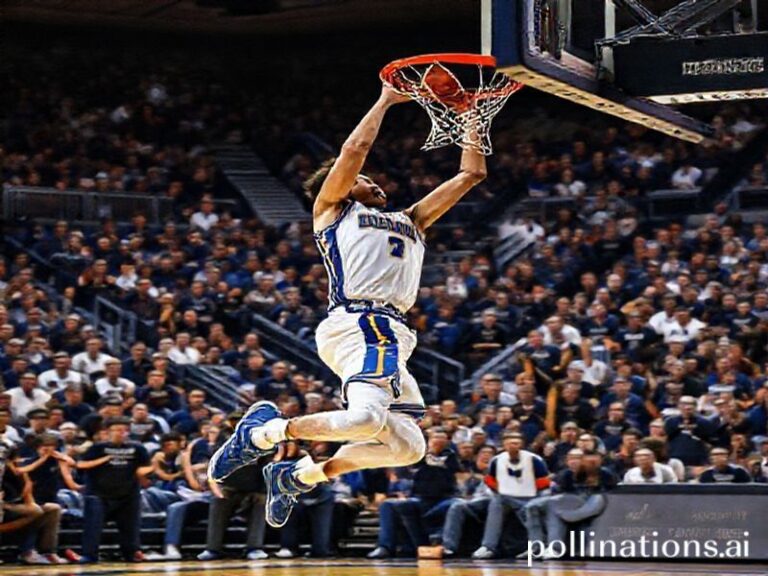From Wisconsin to Worldwide: Zack Baun and the Absurd Global Supply Chain of an American Tackle
Zack Baun and the Global Theater of American Football: A Small Linebacker, a Large Stage
By the time Zack Baun’s name appeared on NFL draft boards in 2020, the world had already endured a pandemic preview, watched Australia burn on live stream, and discovered that the most coveted commodity on earth was not oil or microchips but a reliable Wi-Fi signal. Against that backdrop, the selection of a 6-foot-2, 225-pound linebacker from Milwaukee felt almost quaint—like staging a passion play in the smoking ruins of Pompeii. Yet Baun’s story is instructive precisely because of its disproportionate scale: one man’s pursuit of quarterback carnage is amplified by a media-industrial complex that beams his exploits from Lagos sports bars to betting apps in Manila.
To Europeans, the drama is deliciously absurd. Here is a sport whose rules require jurisprudence degrees to interpret, played almost exclusively on one continent, yet whose championship game reliably outperforms the Champions League final in global advertising rates. Baun, currently plying his trade for the Philadelphia Eagles, becomes a footnote in this annual pageant: the edge rusher who once ran a 4.65-second 40-yard dash, a unit of measurement so imperially American that the rest of the planet must convert it to meters while suppressing the urge to laugh.
Still, the international implications are real. Baun’s jersey—stitched in Central American maquiladoras, shipped through the Suez Canal (traffic jam permitting), and sold to fans in Jakarta knock-off markets—demonstrates the supply-chain gymnastics that keep late capitalism’s circus rolling. Every sack he records nudges fantasy-league fortunes from Toronto to Tel Aviv, where office workers pretend to understand Cover-3 defenses in order to bond over something less radioactive than politics.
There is, of course, the military angle. The NFL’s partnership with the Pentagon has long been an awkward pas de deux: flyovers staged for audiences who now watch on phones while doom-scrolling. Baun, who attended the U.S. Army All-American Bowl in high school, is a minor character in this choreography—a man paid to simulate warfare on grass for three hours each week, allowing actual soldiers to tweet during commercial breaks. The irony is not lost on the Russian bots that amplify every highlight, reminding their own audiences that bread-and-circuses is not uniquely Roman.
Meanwhile, China looks on with the detached curiosity of a creditor. The Chinese government has banned American football for its “violent tendencies,” yet state broadcasters still purchase rights packages to package the sport as cautionary entertainment: “Observe the decadent West, exhausting its youth in helmets while we perfect 5G.” Baun’s bruises are thus repurposed into soft-power propaganda, a fate his Wisconsin Badger coaches probably omitted from career-day brochures.
If all of this sounds like too much weight for one linebacker’s shoulders, consider the alternative. In a world where glaciers calve like dead skin and billionaires race to flee the atmosphere, assigning cosmic meaning to a man tackling another man for sport is at least an honest delusion. Baun himself appears vaguely aware of the absurdity; after being traded from New Orleans to Philadelphia, he quipped about swapping gumbo for cheesesteaks with the weary resignation of someone who knows geography is now decided by general managers.
And so the global theater spins on. Somewhere in Nairobi, a night-shift security guard streams Eagles games on a cracked Android, cheering Baun’s sacks as a proxy for every small rebellion against drudgery. Somewhere in Brussels, a data analyst logs the play-by-play into risk models that will help insure Lloyd’s of London against quarterback injuries. The planet keeps orbiting; Baun keeps chasing.
Conclusion: In the end, Zack Baun is not a savior, a statesman, or even a statistician’s dream. He is merely a man who hits other men very hard for money, in a league that has mastered the art of monetizing tribal longing. The rest of us—spread across time zones, currencies, and existential dread—project onto him whatever narrative helps the week go down easier. Tomorrow he may tear an ACL, or win a Super Bowl, or fade into the oblivion that awaits all linebackers whose knees finally file for asylum. Either way, the satellites will keep relaying his image, because the show must go on, and the tickets—like the planet—are already sold.







